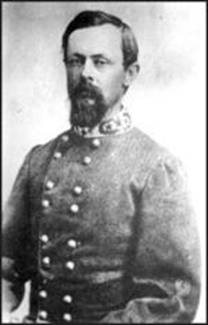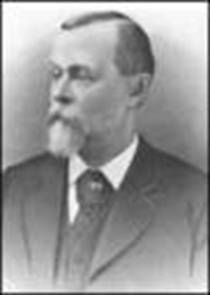By Andy Solomon
Associate Athletics Director
According to Citadel archives, Citadel football games were first played in Hampton Park. The 1926 team, coached by Carl Prause and captained by Ephiram Seabrook ‘27, posted an impressive 7-3 season, the most wins in a single season up to that point. Because of the team’s success, the games brought hordes of people and the park became too crowded. Charleston mayor Thomas Stoney reportedly insisted that the Bulldogs have their own facility, and a football stadium with lights for night games was constructed by the city at the present site.
It was Mayor Stoney who had the facility named for Brigadier General Johnson Hagood. And when the city of Charleston completely rebuilt the facility 21 years later (at a cost of $600,000) and re-opened it on Oct. 16, 1948, the name Johnson Hagood Memorial Stadium remained. (The playing field, however, moved from an east-west direction to its current north-south.)

General Johnson Hagood
Johnson Hagood was born in Barnwell County, SC, on February 21, 1829. His ancestors were of English descent, and the family in America was first established in Virginia, moving to South Carolina before the Revolutionary War. He graduated The Citadel in 1847 – first in his class – and then studied law, having been admitted to the bar in 1850.
Throughout his subsequent career, he maintained an association with the state’s military forces, holding the rank of brigadier general when South Carolina seceded in 1860. He was then elected colonel of the First Regiment, and after participating in the bombardment of Fort Sumter, he was ordered to Virginia, where he was present at the First Battle of Manassas (Bull Run).
Returning to South Carolina with his regiment, he was engaged in the operations about Charleston and the Battle of Secessionville in June 1862, after which he was promoted to brigadier general. Until May 1864, he served on the coast of the state in defense of Charleston during Union Gen. Quincy Adams Gilmore’s siege, and was distinguished for gallantry in the defense of Fort Wagner and the operations on James Island (as chronicled at the end of the movie Glory that starred Matthew Broderick, Morgan Freeman and Denzel Washington).
In June 1864, Gen. Hagood and his gallant men fought at Cold Harbor and soon afterward were sent to meet Gen. Ulysses Grant near Petersburg, VA. During the siege that followed, Hagood’s brigade served in the trenches at one period for 67 days without relief, and was reduced in numbers from 2,300 to 700.
After the Civil War and during reconstruction, Hagood took an aggressive part in the movement that finally brought about the election of Gen. Wade Hampton as the state’s governor in 1876. Hagood was elected comptroller-general on the same ticket, having reorganized the financial condition of the state.
When the Union troops were pulled out of South Carolina, Hagood prevailed upon Gov. Hampton to bring suit against the U.S. Government for payment for the use of The Citadel (then at Marion Square) by U.S. troops as housing and a headquarters. Hagood also pushed for the re-opening of The Citadel, but because money was scarce, it did not happen immediately. The suit against the federal government was successful, and the money from that was used to refurbish The Citadel and the school reopened.

Governor Johnson Hagood
In 1877, Hagood was named the first chairman of The Citadel’s Board of Visitors, a position he held until 1989 when Col. C. Schultz Gadsden, Class of 1852, replaced him. He also served as president of the Association of Citadel Graduates, the forerunner to The Citadel Alumni Association.
In 1878, Hagood was re-elected comptroller, and in 1880, was voted in as governor. His admirable reorganization of the state’s finances was complemented by his honest, business-like and common sense administration as governor. During his term as governor, the General Assembly passed a law that disqualified anyone participating in a duel from holding public office.
Although he was admitted to the bar, Hagood never practiced law and spent time as a planter, an Episcopal minister and writing his memoirs. He married Eloise, the daughter of Senator A. P. Butler, and they had one son, Butler Hagood. Johnson Hagood died on January 4, 1898, in Barnwell, and is buried in Barnwell’s Episcopal Churchyard.
Of Hagood it is said: “There have been greater men, but none truer, none cleaner, higher, and more unalterable in doing the right thing as he saw it; and he saw with clearness and accuracy.”
It has never been documented, however, that he was a football fan.
Attorney and TCBF member R. Daniel Day of Seneca contributed to this story.
